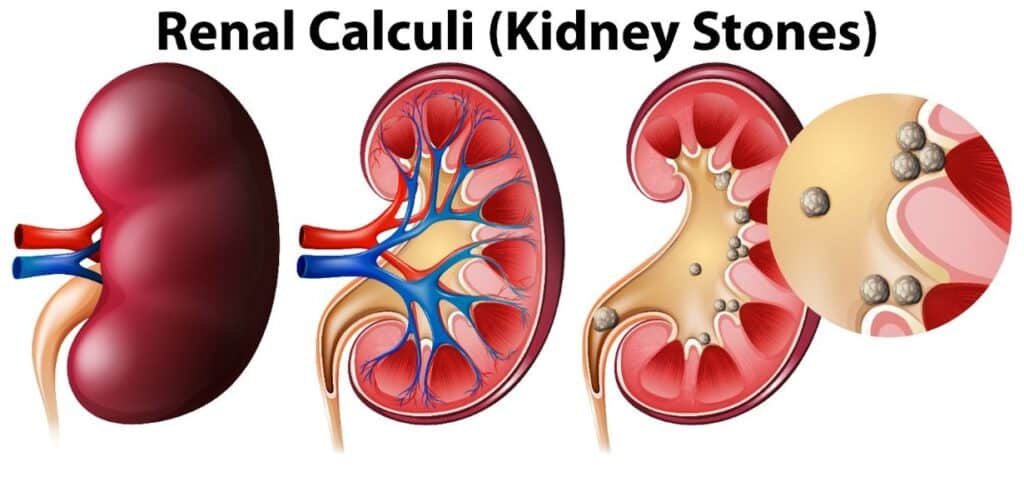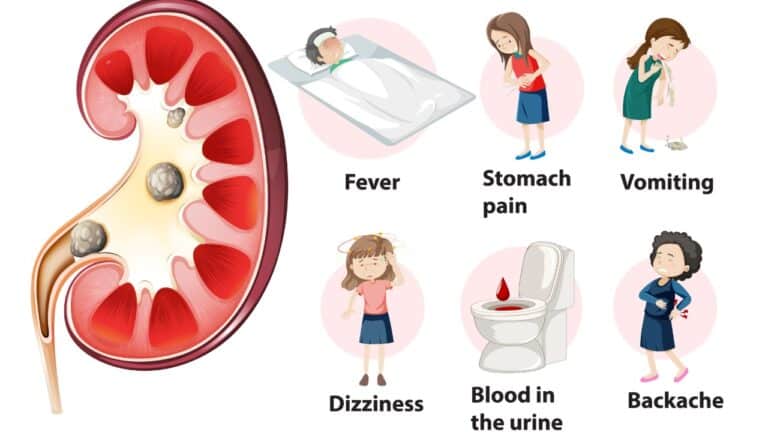-
Opening Hours
Mon - Sat: 10:00 - 19:00
Renal Stone
Home/GIT Disorder/Renal Stone
Treatments
Renal Stone
For kidney stone issues, more than half a million people visit emergency departments annually. According to the estimation report, one in ten people will have kidney stones at some point in their lifetime.
A kidney stone is a piece of solid crystal that is created from substances found in urine. Calcium oxalate, struvite, uric acid, or cystine can all be used to make them. Renal calculus, or stones, is one of the disorders that affect the urinary tract most frequently. It happens to men more often than to women.

How is it formed?
Diverse wastes are dissolved in urine. The solid will only continue to grow unless it is removed from the body through urination. The crystals attract additional substances and combine to create this solid.
The kidney, the body’s main chemical organ, frequently excretes these substances in the urine. Most kidney stones are either flushed out by drinking enough water or are prevented from developing by other substances in the urine. Calcium, urate, oxalate, xanthine, cystine, and phosphate all contribute to the formation of stones. The stone may remain in the kidney once it forms, or it may go through the ureter and into the bladder. Very little stones can occasionally pass through the urine without hurting too much. The urethra, bladder, kidney, and ureter can all experience a pee backup as a result of immovable stones.
Reasons For Renal Stones
A diet heavy in salt or sugar, as well as poor hydration, excessive or insufficient exercise, obesity, and weight loss surgery, are all potential contributing factors. An increased risk of kidney stone development is linked to excessive fructose consumption. Fructose is a component of both table sugar and high-fructose corn syrup. Additional causes are –
- habits of inactivity
- Problems that are hereditary and congenital dietary modifications
- the environment, bladder stagnation, infected urine
- physiological adjustments to urine
- the overproduction of insoluble urine constituents
- Hyperparathyroidism
Renal Stones: Symptoms & Signs
The size of a sand grain describes some kidney stones. Some are the size of a stone. Generally speaking, the symptoms become more visible in the large stone. The following list of signs could apply to one or more of the symptoms
- Persistent lower back pain on either side
- more nebulous pain or a persistent stomach ache
- blood releasing with urine, sickness, fever, and chills
- Cloudy urine with a foul smell
- Hematuria, pyuria, oliguric urination, and abdominal bloating
- Loss of appetite and weight.

Ways to avoid kidney stones
A crucial preventive action is a proper hydration. It’s recommended to drink enough water each day to generate at least 2.5 liters of urine. When you pass more urine, the kidneys are cleaned. You can replace water with fruit juice, ginger ale, or lemon-lime soda to help you drink more fluids. By reducing your intake of salt, animal proteins, oxalate-rich foods, and sodium in general, you can reduce your risk of developing kidney stones.
Foodstuffs that may result in kidney stones
Making dietary changes may help prevent kidney stones in addition to drinking more water. The following foods are some that you may want to limit or stay away from
- beef
- Organ meats of chicken and pork
- Fish, shellfish, eggs
- yogurt, milk, cheese, and processed meats
- frozen quick food dinners
- salty foods
Your chance of getting kidney stones can increase if you consume more animal proteins, such as those found in meat, poultry, seafood, and dairy products.
HOMEOPATHIC INVENTION
Research says that renal calculi also happen when a person feels rejected, isolated, or gets a feeling of abandoned. When someone feels excluded, unwanted, or left out, the risk of developing renal calculi increases in them. This mostly happens with children whose parents leave them in daycare, they experience a feeling that they’re not being loved. This could also happen when a child gets a feeling that their sibling is getting more love and attention from their parents or grandparents.
An existence conflict provokes the person to fear for their life and they constantly feel that their life is at stake. This usually happens to those who feel at this point in their lives they have lost everything.
Homeopathic Approach to treat Renal Stones
Homeopathy is one of the best therapies for kidney stones. Kidney stones can be treated naturally with homeopathy, which also solves the issue. Homeopathic treatments for kidney stones have a twofold action and are secure and organic. The first step in treating kidney stones with homeopathy is to remove any stones already present in the urinary tract, whether they are whole or have been crushed into little sand-like particles.
Additionally, they have the ability to entirely reverse the inclination toward stone production in the near future. The negative effects should be taken into account in addition to the pain while selecting the best homeopathic remedy.
Surgery can be avoided when a person opts for homoeopathy treatment for renal calculi problems. Following proper homoeopathy remedies with a balanced healthy diet, anyone can get rid of renal calculi, and also, the risk of surgeries vanishes. Homeopathy treats a diseased condition in the complete person. Only the doctor’s recommendations should be followed when using medications. Homeopathic medicine aids in the removal of calculus/stones and prevents new stones from forming.
Here are a few examples of homeopathic medications.
It is a well-known homeopathic remedy for treating kidney stones, especially on the left side of the kidney. Patients who complain of unpleasant after-urination pee sensation benefit from the homeopathic treatment. Additionally, this medication efficiently treats the bubbling sensation in the kidneys.
The homeopathic medication lycopodium clavatum is another option for treating kidney stones that are affecting the right side of the body. A person who has right kidney pain can be treated with a medication that contains lycopodium clavatum.
Homeopathic kidney stone treatment using Cantharis vesicatoria can be quite useful for people who have a severe burning sensation when passing urine. Cantharis vesicatoria symptoms, such as a burning feeling that precedes urination and persists after it, point to the need for relief.
Sarsaparilla officinalis is a good kidney stone homeopathic remedy for people who experience severe burning and white sediments in their urine. You have less discomfort as a result of your right-sided kidney stone.
There are varieties of alternative treatment options available, despite the fact that kidney stones can be a painful and unpleasant problem to deal with. In truth, there are numerous drugs and treatments that can assist treat symptoms and encourage kidney stone clearance. It is undeniable that homeopathy is the greatest remedy to use and the fastest way to completely remove these large kidney stones. Renal stone prevention and treatment are quite successful using homeopathic treatments. Without requiring any surgical or laparoscopic treatments, it has been widely utilized by many people to dissolve and eliminate kidney stones.
Homeopathic treatments for kidney stones have consistently shown to be the most effective option when combined with a healthy diet and lots of fluids. It also has the propensity to shield your body from potential ill effects.
For appointment please call @ 020 27455480 / +91 9405 435 981
-
Opening Hours
Mon - Sat: 10:00 - 19:00